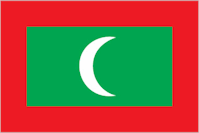Government of the Republic Maldives (GORM)
 A 1968 referendum approved the constitution, making Maldives a republic with executive, legislative, and judicial branches of government. Government organization is based on the 1968 constitution, as amended in 1970, 1972, 1975, and again in 2008.
A 1968 referendum approved the constitution, making Maldives a republic with executive, legislative, and judicial branches of government. Government organization is based on the 1968 constitution, as amended in 1970, 1972, 1975, and again in 2008.
The document provides the basis for a highly centralized, presidential form of government. Its philosophical frame of reference is derived from Islam; thus the distinction between secular and religious authority was often academic. The constitution vests final authority for the propagation of Islam in the president, who in turn is empowered to appoint all judges who interpret and apply the sharia in the adjudication of civil and criminal cases. In Maldives, therefore, the courts are not independent of the executive branch, but rather were under the minister of justice, who was appointed by the president.
Constitutional provisions regarding the basic rights of the people are broadly phrased. They refer to freedom of speech and assembly, equality before the law, and the right to own property, but these rights were to be exercised within the frame- work of the sharia. In 1990 younger members of the recently expanded president's Consultative Council called for the repeal or amendment of Article 38 in the penal code, which allows the jailing or banishment "for any gesture, speech or action that instills malice or disobedience in the minds of Maldivians against lawfully formed government."
The president was elected for a renewable five-year term by the Majlis, or legislature. The election must be formalized through confirmation in a popular referendum. The chief executive is assisted by a cabinet, or Council of Ministers, whose members serve at his pleasure. The post of prime minister, which had existed under the sultan and in the early years of the republic, was eliminated in 1975 by President Ibrahim Nasir because of abuses of the office. Cabinet ministers need not be members of the Majlis. The legislature is unicameral, with members elected for five-year terms by citizens aged twenty-one and above, or appointed by the president. Eight of its forty-eight members are appointed by the president, and the rest are chosen popularly, two from Male and two from each of the nineteen administrative atolls.
President Nasheed was inaugurated on November 11, 2008 as head of the executive branch. Nasheed reduced the number of government ministries from 21 to 14, appointed a 14-member cabinet, and replaced the eight Majlis members appointed by his predecessor. Nasheed resigned on February 7, 2012, which he deemed was forced. Vice President Dr. Mohamed Waheed was sworn in as President.
The unicameral Majlis, elected in May 2009, was composed of 77 members serving 5-year terms. In February 2009, the Majlis passed legislation that increased the number of seats to 77 from 50. Election results were: DRP 36.8%, MDP 32.9 %, PA 9.2%, DQP 2.6% Republican Party 1.3%, independents 17.1%; seats by party--DRP 28, MDP 26, PA 7, DQP 2, Republican Party 1, independents 13.
The Maldivian legal system--a mixture of traditional Islamic and common-law principles--is administered by an attorney general, prosecutor general, secular officials, a chief justice, and lesser judges on each of the 19 atolls, who are appointed by the president. A new Supreme Court appointed by the previous President, Gayoom, took office in September 2008. Under the laws of the 2008 constitution, however, the judiciary has been subject to review by the Judicial Services Commission, and permanent Supreme Court justices were sworn in on August 10, 2010. High Court judges were appointed on March 27, 2011. Every inhabited island has a magistrate court.
|
NEWSLETTER
|
| Join the GlobalSecurity.org mailing list |
|
|
|

